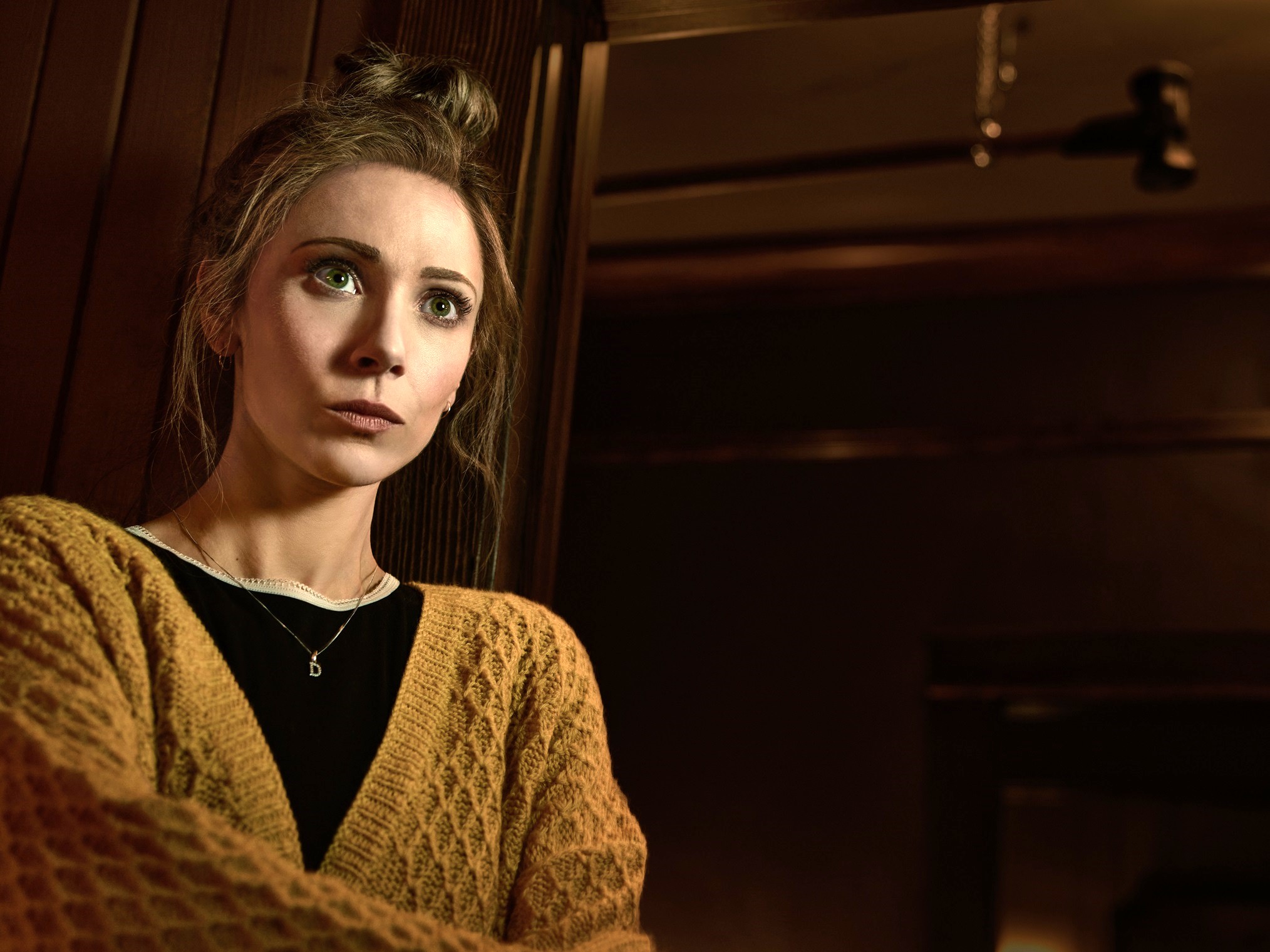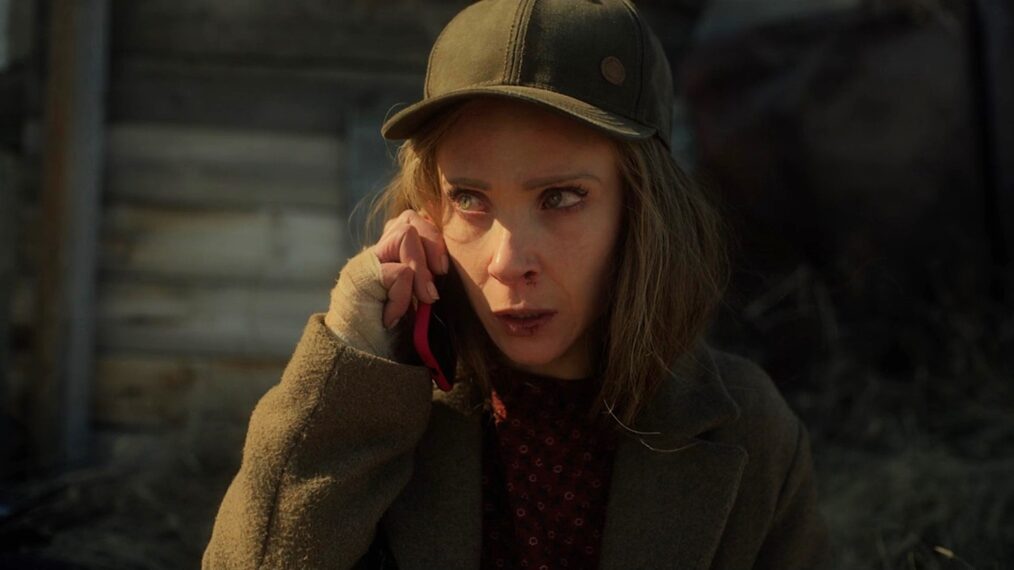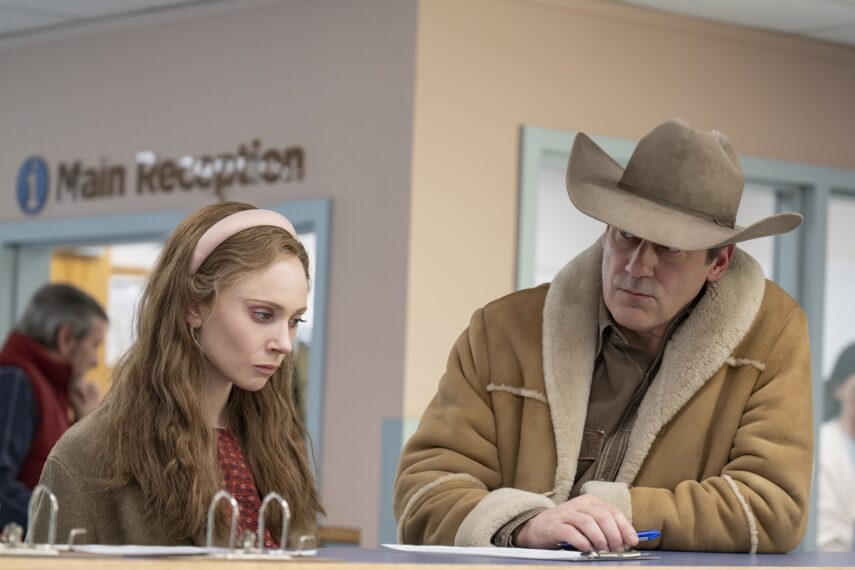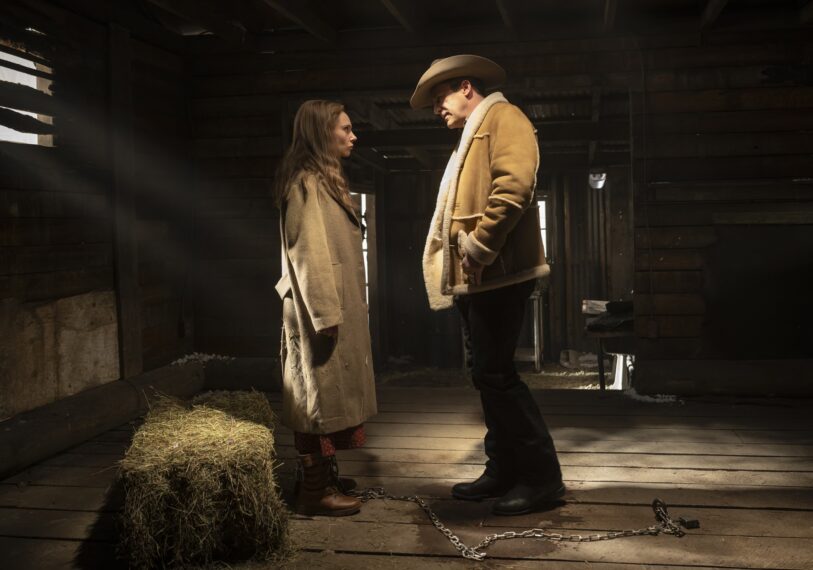Juno Temple has built quite a resume for herself over the years onscreen, working with an array of buzzy costars and directors, but she’s certainly best known to most audiences as Keeley Jones, the model-turned-PR lead for A.F.C. Richmond in Apple TV+‘s Ted Lasso. So, when she returned to audiences as Dot Lyon in FX‘s acclaimed limited series Fargo, Temple was a far cry from the outspoken and colorfully-clad Keeley, opting for the dramatic portrayal as the Midwestern housewife.
Dot goes through so much during Fargo‘s 2019-set fifth chapter which unfolds over ten episodes. Fearful of the past that she ran from as Nadine, Dot wishes to preserve the peace she’s found with husband Wayne (David Rysdahl) and daughter Scotty (Sienna King). But her abusive first husband Roy Tillman (an eerily scary Jon Hamm) is determined to recapture his runaway bride, feeling a debt is owed.
As the season unfolds, viewers get a look at the lengths Dot’s willing to go in order to protect her family and what traumas she’s endured that have formed her into the person she is now. Add in a contentious mother-in-law in Jennifer Jason Leigh‘s Lorraine Lyon, and Temple has so much to work with, making her recent Emmy nomination for Outstanding Lead Actress in a Limited or Anthology Series or Movie entirely unsurprising.

Frank W Ockenfels III/FX
Below, Temple opens up about crafting Dot for TV with Fargo showrunner Noah Hawley, addressing domestic violence through her story, that puppet show moment, Dot and Lorraine’s emotional phone call, and much more.
Fargo celebrated its tenth anniversary this year. How does it feel to be recognized for your role in the latest chapter?
Juno Temple: I couldn’t be more proud. I think that the show resonates because it always talks about important things that are going on in the world, but mainly in America. Having hard work recognized is something I’m so grateful for and for all of the people that got recognized as a part of this Fargo family. It’s real teamwork, and I think for me, this character has, from the minute she appeared in my inbox and from the page, to getting to run around in her shoes, she’s changed my life. I’m just proud that people are watching her because I think she taught me a lot and inspired me, and I feel really proud to put her out in the world.
Dot’s a woman who has been a victim and for that reason approaches certain situations in a peculiar way that might otherwise elicit judgment from people around her. How do you balance embracing her more absurd behaviors with her more relatable qualities?
I think she’s a survivalist. She’s survived situations and will keep doing so to protect the things that she loves. At the same time as being this surviving warrior, she’s also a real nurturer. So with the duality of the two, she’s always got space for some love. Whatever situation is going on, I sympathized and loved her from the minute I started reading about her, and I didn’t know all of the answers at the time. When I got to Calgary to start filming, [I talked] to Noah about her past and what it was to be Nadine, and what things she has escaped from, and what journey got her to where she is right now. I had to know all along what was going on with her so that you could understand how she behaved in certain ways at the beginning and why she didn’t immediately ask for help.

FX
And ultimately the choices she was making were about protecting her family. And so I think even though some of them didn’t necessarily pan out the way she wanted and some caused damage to people that she really loves, it was never about wanting to inflict pain for no reason. There was always an element of wanting to protect the people she loved the most. She can’t stop to [sort out those mistakes] because she’s got to figure out [how to prevent] the past from coming back and ruining everything. When you are dealing with someone as scary as Roy Tillman, who’s above the law, it’s not as simple as going to ask for help.
One of the most important relationships this season is between Dot and her mother-in-law Lorraine. At the start they’re on opposite sides and by the end, Lorraine is calling Dot her daughter in an emotional phone call. What was it like getting to see their journey unfold as a performer?
I love that you said that. It was a really important journey for me too. [Getting] to create it with somebody like Jennifer Jason Leigh who has been blowing all of our minds in different performances for a long time… She’s such a brilliant pro and she’s such a kind, curious, and loving woman. We had a lot of fun because we really connected. And when you do get on with somebody, you can push things in a way that you don’t always get to because it’s safe. It’s not about trying to one-up somebody for any other reason than we’re going to play. So the two cats are out, let them f**king fight. And I think her performance from the first day that we got to work together was so mesmerizing. It was really feline and felt like she was a wildcat looking at everyone like they were prey, but it was all about whether they were worth eating or not. But she wasn’t sure about me.
And there’s that great sequence where she comes over and I slightly changed the accent and her reaction was so magical. After that, we had this great chat about how [we hoped to] become family by the end of this, but we weren’t sure. And I think getting to have these scenes where you heighten a relationship like that with an actress who has been an inspiration to you forever is a dream come true. And so, the payoff at the end is that phone call. When I was shooting the first take, I’d never heard that phone call before, I’d only read it on the page, but I hadn’t heard Jennifer’s [side of the] call. And so that was a genuine reaction. Lorraine is a really strong woman who’s made herself this success, and ultimately she’s a woman who has confidence in her brain and her ability to run things that she can be a genuine match for somebody like Roy Tillman, which I think is pretty badass.

(Credit: Michelle Faye/FX)
The dynamic between Roy and Dot really transforms in later episodes. What’s the most daunting aspect about approaching those more physical scenes with Jon Hamm? Was there catharsis in Dot getting to shoot Roy on the front porch in the finale?
Yeah, I definitely did [feel catharsis]. I also think that a big part of filming that whole journey between these two people was about protecting the people you’re working with. It’s crazy how many people have experienced domestic violence and when you’re playing somebody who has experienced it, [survivors] talk to you about their experiences, and that’s really precious to me, that means a lot. When people decide to talk to me about their personal lives, I will protect that with everything. And so the main thing I can think of with that was about wanting to make it a closed set and making sure that people that didn’t want to come to work that day didn’t have to because you don’t want to create fresh trauma. That’s not what we want to do.
It was done so brilliantly with the puppet show where we didn’t actually have to see a reenactment of Nadine’s past. And I think it was really important that we continued that respect of [not wanting to inflict] potential new traumas. That was really important to me, and also having a space where people felt like if they weren’t feeling okay, they could go and sit down and just take a beat and there’s no judgment. That s**t is awful, and it is going on everywhere all the time. I think it’s really important to not create new traumas.
I rehearsed with a stunt coordinator, and I had the most brilliant stunt double Louise [Hradsky] on Fargo, so those sequences were not being made up as we went along. They were choreographed, otherwise they could go wrong. Having someone like Jon Hamm on the other side of the chain meant I also felt very respected and safe. That means a lot because then you can go to the places you need to go to that are as dark as they need to be. And then yes, you have an outcome where you get to shoot him.

Michelle Faye/FX
But it’s interesting too because it ends up costing the life of somebody she really cares about [with Lamorne Morris‘s Witt Farr]. It’s a bittersweet moment. But she does make it back to her family. And I think in general, the journey of playing Dot and getting to the end with that incredible last supper with the forgiveness biscuit felt cathartic. To be able to say to somebody, maybe you should try forgiveness and see how that feels instead of debts you think you’re owed and vice versa.
In the episode, “Linda,” Dot shares the backstory of her abusive relationship with Roy through a puppet show that’s less exploitative than using live-action flashback scenes, but no less impactful. What was it like providing voices for the characters in that sequence and how important was that for Dot’s journey?
It was interesting because I knew in the episode that was a dream sequence, and the study of dreams is a really interesting thing because if you break down your dreams, apparently you are everything and everyone within a dream. So I remember talking to the director Sylvain [White] about the sequence and asking what was going to happen with the voices and stuff. I was like, [it might be] interesting if I maybe do the voices. It was actually not initially an idea. I remember it being a day when we were trying to record it quickly in a van, and I was like, “Do you want me to just do all the voices?” And if you rewatch the episode after realizing what is happening, I think it makes a lot of sense that in her subconscious, she would be everybody.

Michelle Faye/FX
Dreams are a way for us to download stuff that we didn’t get to throughout life, and so it is our subconscious debriefing. I don’t think she’s said anything about her past to anybody before. And so the fact that she would act it out with puppets within a dream makes a lot of sense to me because she hasn’t dealt with that trauma yet and she hasn’t gotten away from it fully yet. I felt like it was a really smart and non-exploitative way of talking about a past that could be hard to watch. And I also think it made it incredibly emotional.
As terrifying as it is for Dot to wake up in the hospital to Roy following that dream, do you think her journey with the puppets made her more ready for the events she’d face in the final episodes?
Because she doesn’t realize it’s a dream, she has no idea. And so the fact that she doesn’t know if Linda’s dead or not, she doesn’t know until in Episode 8 when she really realizes…
The windmill is where the bodies are buried…
Oh my God. And in conversations with Noah about that, I was like, she probably even saw the body go down. She blocked that out. We do when we go through traumas. And so that’s why in her dreams too, there’s this kind of scrambled version of at the end, Linda and the car and the whole combination of it. But truly she believes that that is not the case until that moment in Episode 8 [when Dave Foley‘s Danish Graves is thrown in there]. I think, yes, it probably gives her a fire to be able to fight and get through what she needs to get through to survive this situation, but that is the moment when she realizes it was a dream.
At the start of the series, Dot isn’t forthcoming about her situation when Witt Farr tries to help her. Does his sacrifice and effort to save her at Roy’s ranch inspire her to live more honestly moving forward?
Yeah, I’m sure. And I don’t think she would be open with everybody necessarily, but I think she would be with her family. And I think also Lorraine inviting her into the family means there probably wouldn’t be a choice either. She finally killed the monster under the bed too, but I think she will always go and visit Witt’s grave every year. I think she will always do that because that matters to her. Every year she’ll say thank you for saving me and my family.
FX’s Fargo, Year 5, Streaming now, Hulu
